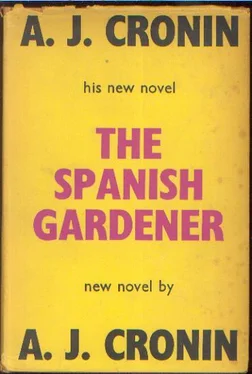Archibald Cronin - The Spanish gardener
Здесь есть возможность читать онлайн «Archibald Cronin - The Spanish gardener» весь текст электронной книги совершенно бесплатно (целиком полную версию без сокращений). В некоторых случаях можно слушать аудио, скачать через торрент в формате fb2 и присутствует краткое содержание. Жанр: Классическая проза, на английском языке. Описание произведения, (предисловие) а так же отзывы посетителей доступны на портале библиотеки ЛибКат.
- Название:The Spanish gardener
- Автор:
- Жанр:
- Год:неизвестен
- ISBN:нет данных
- Рейтинг книги:4 / 5. Голосов: 1
-
Избранное:Добавить в избранное
- Отзывы:
-
Ваша оценка:
- 80
- 1
- 2
- 3
- 4
- 5
The Spanish gardener: краткое содержание, описание и аннотация
Предлагаем к чтению аннотацию, описание, краткое содержание или предисловие (зависит от того, что написал сам автор книги «The Spanish gardener»). Если вы не нашли необходимую информацию о книге — напишите в комментариях, мы постараемся отыскать её.
The Spanish gardener — читать онлайн бесплатно полную книгу (весь текст) целиком
Ниже представлен текст книги, разбитый по страницам. Система сохранения места последней прочитанной страницы, позволяет с удобством читать онлайн бесплатно книгу «The Spanish gardener», без необходимости каждый раз заново искать на чём Вы остановились. Поставьте закладку, и сможете в любой момент перейти на страницу, на которой закончили чтение.
Интервал:
Закладка:
A moment later Nicholas was in the big Cordova bed, its end-piece covered in stamped yellow leather and edged with heavy brass studs. Yet still the Consul lingered, glancing with a kind of self-conscious hesitation at the slight figure lost, almost, under the great brocaded counterpane.
"Of course, dear boy … you are too tired for our reading tonight?"
Nicholas, indeed, was dizzy from fatigue and his eyelids, violet shadowed in his small pale face, were drooping, as though drugged with sleep. Yet he knew how much store his father set by this final chapter of their evening ritual and, summoning a smile, he protested that he was still quite wide awake.
Again the Consul hesitated, but only for a moment, before yielding to the inclination which his affection, his passion for his beloved child, made him loath to forgo. Entering his own room, he returned speedily with a heavy bound volume of Akerman's Book of Ornithology , seated himself beside the soft Cordova bed, and put on his horn-rimmed glasses.
“You remember, Nicholas, that on our last evening at Arville we were discussing the birds of South Africa—a most interesting subject. We shall not take much tonight, just enough to keep ourselves in touch. Ah, here we are.” He had turned the pages until he found the place and now, clearing his throat, he began to read.
The ostrich, genus Struthio, characterized by the possession of two toes and the absence of keel on the breast bone, is the largest living bird. The male may be nearly seven feet high and weigh as much as three hundred pounds. Ranging the sandy plains and open country, it is fleet of foot and when brought to bay can be extremely fierce. The birds are immensely vain of their feathers and the male especially displays great solicitude for its young …
Chapter 2
NEXT MORNING the Consul rose early and left punctually for his office. Nicholas, unfortunately, had passed an unquiet night in which, through the torpor which bound him, the events of the journey, the grinding of engine wheels, the sound of the surf and, for some absurd reason, the dark impassive figure of the butler, were inextricably mingled. His temperature showed normal, but his father seemed to detect a lingering flush of excitement upon his cheeks, and insisted that the boy remain in bed—promising, however, to return at noon to see if he might get up for lunch.
It was a disappointment for Nicholas, who wished he might at least have lain outside in that lovely garden. But he was an obedient child, well versed by now in his own physical deficiencies, in the regular routine of thermometer reading and pulse checking prescribed by Professor Halevy and, in a queer, prim way, gratefully expectant of the solicitude which his father constantly bestowed upon him.
Magdalena brought up his breakfast, rather breathless from her ascent of the stairs, but quite friendly, her black eyes almost hidden by the creases in her plump brown cheeks. A white scarf wrapped about her head and two metal rings dangling from her ears gave her an interesting, gipsy look. Thanks to his father's tutoring, Nicholas spoke creditable Spanish—he had, indeed, a precocious knowledge of French and Italian besides—but Magdalena's rapid chatter was some kind of dialect, Catalan he thought, and they could not understand each other very well. As she stood there, with hands on her hips, he detected a frank peasant curiosity in her gaze and, in response, he dramatized himself a little, blinking his long eyelashes and swallowing his breath so that he could break it in his stomach with an alarming rumble. At this she laughed shortly, shook her head, and went away.
The breakfast was his usual, and quite nice: a lightly boiled egg, crisp zweibacks and comb honey, a glass of boiled goat's milk; obviously his father had been giving orders in the kitchen. Nicholas ate the food slowly, using his experience to avoid putting crumbs on the sheet. Then he hopped out and brought over the woolly hound which, with four short legs planted on the dressing table, had silently and faithfully awaited his attentions. Nicholas knew, of course, that he could not possess a live dog. The Consul, himself no dog lover, had logically explained how this was precluded by the difficulties and uncertainties of their too mobile existence, so the child had made the best of this small stuffed substitute. This morning, however, he was scarcely in the mood for one of those long conversations which so often beguiled, for both of them, the tedious hours. Nor could he bring himself to glance, more than perfunctorily, at the lesson books which his father had placed, convenient to his hand, on the bedside table. No, he was too highly keyed by the novelty of these still unexplored surroundings and, while a bright square of sunlight slid warmly across the striped maroon wallpaper, stamped with strange arabesques, which fancy might make still stranger, he lay on his back, listening, as it were, to the silent heart-beat of the house.
Yet the beat was not altogether silent. Sounds came from downstairs, disturbing sounds, as of an argument—high words, followed by the banging of what Nicholas guessed to be the kitchen door. Then came the low undertone of whispering, footsteps in the dining-room below, unhurried tidying-up movements, an ascending whiff of strong tobacco. Construing all this, somewhat rigidly, Nicholas was taken aback, quite startled in fact, by the sudden quiet opening of his door. He turned and there, gazing at him with a confidential air, was Garcia.
Unaccountably, the blood rushed to the little boy's cheeks. That queer distrust of the butler which he had felt on the previous evening, as though from the outset he sensed in him an enemy, returned with redoubled force at this unexpected materialization.
"Shall I take your tray?" Garcia spoke with exaggerated deference, in an insinuating manner—yet, as if to give that the lie, he kept his cigarette burning between his nicotined fingers.
"Please … thank you," Nicholas answered in a small, unsteady voice.
The man did not move but showed his teeth in what, but for the general immobility of his features, might have been a smile.
"Don't mind me," he said softly. "I am well used to children. In one place there were seven. The little girl used to sit upon my knee. Before she died."
Nicholas took a quick breath. The butler drew deeply, absently, upon his brown cigarette yet never removed his eyes from the small boy's face.
"One day I will tell you about her. It would make an interesting talk for us. I've seen many things. Sad and horrible things. Unbelievable things. The world is full of idiots. Nothing matters to me, absolutely nothing."
"What do you mean?" Nicholas gasped.
Garcia shrugged indifferently.
"You will see. I have been a soldier. An officer. I have seen men flogged, tortured, and shot. But we will speak of that another time. Tell me. Where is your mother?"
Nicholas turned pale. The question, thrown casually, yet with a hidden insolence, pierced anew the deepest, the most secret scar, in his shrinking soul. For an instant of panic he thought of answering, "She is dead." Had not his father insisted often, with melancholy gravity, that she must now, indeed, be considered as dead to both of them? And only that evening Christian prayer for her forgiveness saved her from an oblivion equal to the grave. Yet an instinct within him repudiated the lie, less from a natural innocence than from the strange precognition that if he lied to this man his defences would, once and for all, be swept away. He would be lost.
"She is in America," he stammered.
"Ah!" Garcia exclaimed, "A wonderful country. But why not here?"
With a trembling of his chin which made his lips and delicate nostrils quiver, and the skin of his forehead contract, Nicholas brought out the words.
Читать дальшеИнтервал:
Закладка:
Похожие книги на «The Spanish gardener»
Представляем Вашему вниманию похожие книги на «The Spanish gardener» списком для выбора. Мы отобрали схожую по названию и смыслу литературу в надежде предоставить читателям больше вариантов отыскать новые, интересные, ещё непрочитанные произведения.
Обсуждение, отзывы о книге «The Spanish gardener» и просто собственные мнения читателей. Оставьте ваши комментарии, напишите, что Вы думаете о произведении, его смысле или главных героях. Укажите что конкретно понравилось, а что нет, и почему Вы так считаете.












